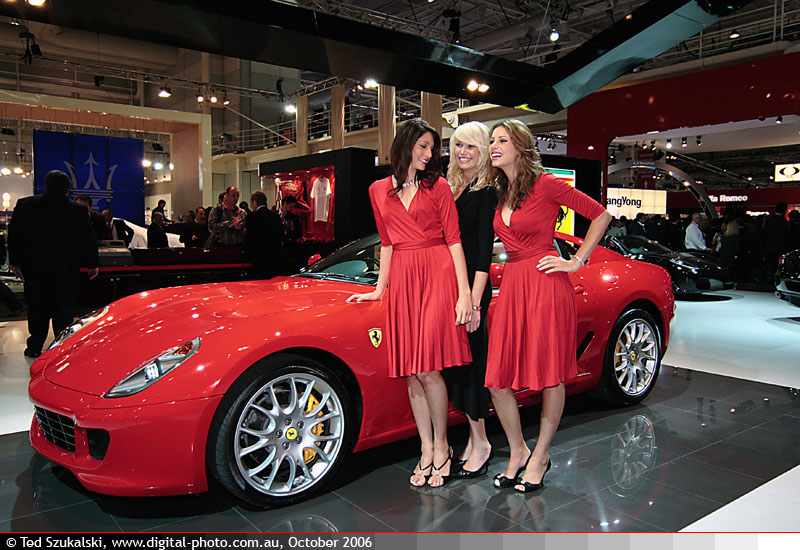Climate Policy as Farce
December 18th, 2007Posted by: Roger Pielke, Jr.
According to The Telegraph to deal with the issue of climate change the UK’s Chief Scientific Adviser, Professor Sir David King, has encouraged a “cultural change” among women to prefer men who save energy, rather than hog it, such as by driving Ferrari’s. And for those of you unfamiliar with UK newspapers, it is important to point out that The Telegraph is not the UK’s version of The Onion.

Here is an excerpt:
Professor Sir David King said governments could only do so much to control greenhouse gas emissions and it was time for a cultural change among the British public.
And he singled out women who find supercar drivers “sexy”, adding that they should divert their affections to men who live more environmentally-friendly lives.
His comments were greeted with anger by sports car drivers who insisted that their vehicles’ greenhouse gas emissions were tiny compared with those from four-wheel-drive vehicles.
Sir David, who is due to retire as the UK’s Chief Scientific Adviser at the end of the year, said individuals needed to change their behaviour.
“I was asked at a lecture by a young woman about what she could do and I told her to stop admiring young men in Ferraris,” he said.
“What I was saying is that you have got to admire people who are conserving energy and not those wilfully using it.”
Sir David, who persuaded the Government to start using the Toyota Prius, a hybrid car that claims to have lower emissions than most conventional cars, added: “Government has so many levers that it can pull – when it comes to the business sector it is quite effective.
“As soon as you come to the individual, however, they will buy a Ferrari, not because it is cheap to run or has low carbon dioxide emissions, but because young women think it is sexy to see men driving Ferraris. That is the area where a culture change is needed.”
Meanwhile, Europe is divided about strengthening regulations on emissions from autos:
Emergency talks aimed at setting EU targets to reduce CO2 car emissions are being held today amid fears that bitter wrangling between car manufacturing countries could delay or even derail the process entirely.
The European Commission is due to adopt a draft regulation tomorrow on reducing carbon emissions from passenger cars to 120 grams per kilometre within five years, but a bitter fallout between European heavyweights has plunged the key negotiations into crisis. Member states with car manufacturers that traditionally produce heavy, energy-hungry cars are concerned that the emission targets will unfairly benefit those businesses that make lighter, more efficient vehicles.
France and Germany, in particular, are believed to be at loggerheads over the Commission’s proposals. French manufacturers such as Peugeot-Citroen have already reduced their carbon emissions to 140g for their cars, whereas German companies such as BMW, Mercedes and Daimler still lag behind on emission targets because their vehicles are heavier and higher performance models. Sweden, which also tends to make larger cars, is also thought to be unhappy about the proposals, while Italy is backing France.
What is lost among this empty moralizing and trade disputes is that a zero-emission Ferrari would require no need to change the libidinal desires of young women (granting Prof. King’s dubious premise), nor an embarrassing trade dispute between countries committed to reducing emissions.
These anecdotes — frustrating and farcical as they may be — illustrate a serious underlying point: Much of climate debate is exactly backwards. Advocates are spending far too much time arguing over how important that it is that others change their behavior, usually in ways that those doing the advocating would want regardless of climate change. In this way climate change becomes not a problem to be solved but a political weapon in service of other goals. The alternative to the dominant approach to climate change would be to initiate those steps that will actually make a difference, thus enabling political compromise. As Dan Sarewitz and I have often argued it is often technological advances that enable compromise rather than vice versa. And in the case of climate change those steps that will actually make a difference begin with making the costs of producing alternative energy cheaper than fossil fuels (as Shellenberger and Nordhaus have argued, and now Google), and working to make people and ecosystems more resilient/less vulnerable to climate impacts. Of course many groups are doing exactly this, but they are certainly not those leading the charge on climate policy.
December 20th, 2007 at 9:41 am
My brother’s-in-law jointly own a Ferrari, and they report that absolutely no young women have made any advances at them during car shows. (And it’s a nice Ferrari that often wins competitions.) They report similar results for the collectible Corvette.
I could ask them to poll all members of the Chicago chapter of the Ferrari club of American. My bet is that the owners will generally report that Ferrari’s are not exceptionally good chick-magnets.